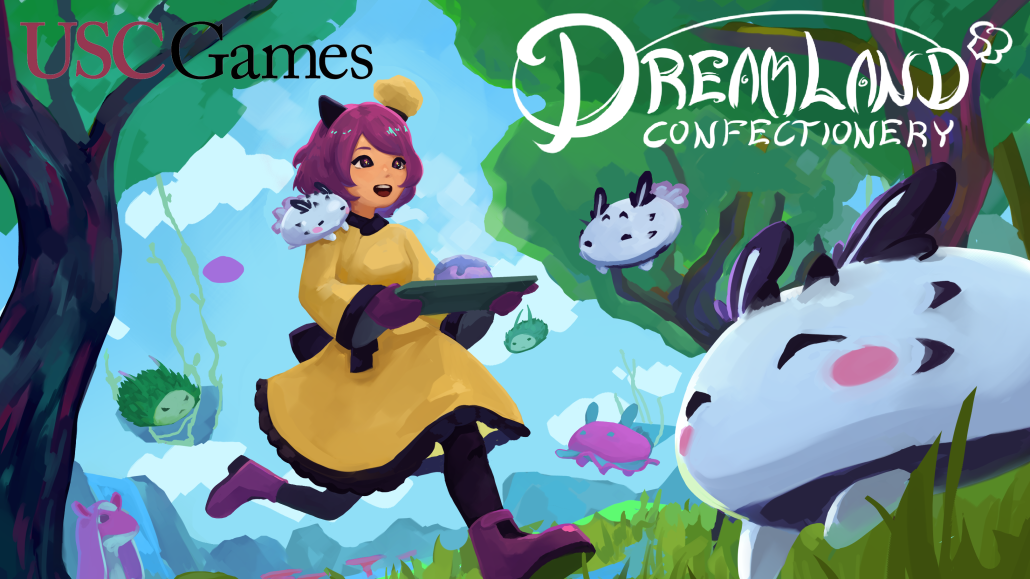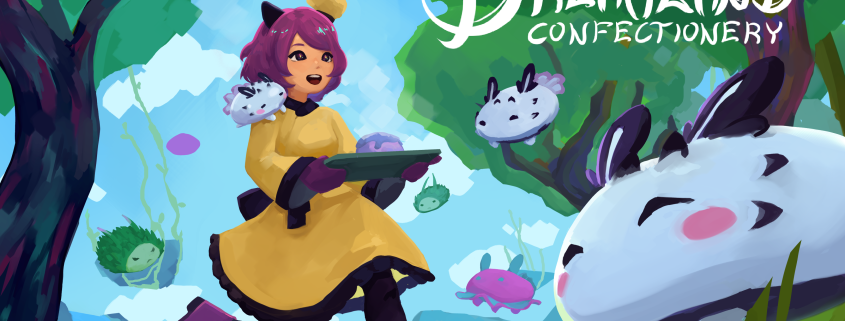Students create a virtual wonderland

Ever wanted to fall into the world of your childhood imagination? Bake desserts for cute little creatures? Indulge in the innocence of your youngest hopes and dreams?
Whether you’re a seasoned veteran at playing games or a beginner simply looking for your next game to try, Dreamland Confectionery, an action-adventure PC game developed and designed by a team of USC students, might satisfy your sweet interests.
The idea for Dreamland Confectionery first sprouted when Ah Young Joo, a senior majoring in interactive media and game design, took an “Intermediate Game Development” course in her junior year. Though the versions have grown in its gradual expansion, the team has remained faithful to the game’s core conceptual ideas: baking and exploration.
A game encompasses numerous elements like audio (dialogue and composed music), 2D and 3D visuals, writing and engineering, which Joo explained makes collaboration especially critical for a game driven by its storytelling.
“Games basically mix [art and engineering] almost equally because art is super into creating the experience, and you need the engineering to make the game,” said Joo about the interdisciplinary work that goes into a video game. “I think it provides this well-rounded environment where even if you’re not an engineer, you’ll be able to be around artists or audio people or pretty much all departments go into making a game.”
Weston Bell-Geddes, a junior majoring in interactive entertainment and cinematic arts, is a producer and marketing lead for the game. For him, games are a medium for self-expression.
“In a video game, you can actually make choices,” he said.
The team has worked remotely, communicating through platforms like Discord until recently. Working together virtually allowed more flexibility for team members to contribute when they were able and connect from wherever they happened to be, Joo said.
For example, art lead Irmak (Max) Cavun worked remotely from Turkey, which has an 11-hour time difference with Los Angeles.
However far they were, Cavun recalls the remote working environment as memorable because it brought about an increased sense of community with team members.
“I enjoyed, and I still do enjoy, being able to work with very different people and around the world,” said Cavun, a sophomore majoring in interactive entertainment. “Cause there’s [team members] that don’t go to USC and that don’t even live in the United States, and as far as I know, that’s not something you encounter very much in other USC game projects.”
The team will be presenting this demo version at Steam Next Fest, a virtual festival that will take place Feb. 21 through Feb. 28.
Dreamland Confectionery’s narrative, written by the team, follows Ami, an adult who falls into the imaginary wonderland she created during her childhood. She embarks on a journey to discover the key to waking up from her dream while encountering spirits and gaining their abilities by befriending and baking treats to satisfy their sweet tooth along the way. By the end of this journey, Ami recovers the important dreams she pushed away in her reality.
Players will follow Ami through her magical fantasy wonderland.
“It’s full of all that magical delight,” Joo said. “But at the same time, it’s not just another fantasy world.”
Ami’s story touches on mental health themes such as anxiety and depression. Emphasizing the importance of balancing depth with fun, the team hopes that players find details in the game that personally resonate with them — a point that makes a game particularly special.
But instead of hoping that players pay attention to certain things about the game, Cavun said, reiterating Joo’s previous statement that the creative team wants Dreamland players to experience the world for themselves, instead of being directed by creators.
“We are building the world; we are building the characters. There’s a world; there are these memories. There’s these characters, [and] they’re complex, and they have all these things that you know you wouldn’t be able to fit into a game,” Cavun said. “But they’re there in the small details, like for example, in the pictures and the frames you can find around the world, or small moments or remnants of their memories, and so on. They’re just there. We’re not forcing anyone to look at them, but if they wanted to, they can and that will lead to a portrayal of some [intentional] themes.”
Dreamland Confectionery will launch its playable demo version next Monday on its steam page, available for anyone with a Steam account, Bell-Geddes said.
The team currently aims to release an early access version of the game to receive feedback from the local and global community.
Dreamland Confectionery is so special because of more than the actual game, Bell-Geddes said. The best part of the project are the amazing people involved and their passion for the project.
“It is inspiring because this isn’t really a class project, right? Everyone on this project and USC Games, they’re not doing it for credit, for money or anything. They’re doing it because they love the project and they really want it to succeed,” Bell-Geddes said. “This project is 100% driven by dedication and enjoyment for the people that are working on it, and for the passion and enthusiasm of making a really, really great game.”

